
20 Dec 2023
Henry’s journey from ALL patient to happy dog owner
When Henry Charles first began to show symptoms of what his family now knows was leukaemia, it was lockdown time in 2020. His mum Tajana says that the changes in her ten-year-old son were so subtle that it took a long time to notice them.
“I put his symptoms down to all sorts of things, but never thought he was seriously ill until he was diagnosed,” said Tajana, 43, who lives with husband Chris and Henry’s younger brother George in a village near Norwich, Norfolk.
“He had temperatures on and off at night – just for an hour then he would be fine. And he had bleeding gums which we thought were from wobbly baby teeth. But then he started to become much more withdrawn. He used to play a lot with George, who was eight at the time, but that slowed down. We had a tent in the garden for the summer and all he wanted to do was sit in there and read books. Because it was lockdown we just thought maybe he’s missing his friends. But he seemed more agitated and would tell us to go away a lot. We put that down to lockdown stress.”
“He started losing weight which I thought it was his age and that he was growing. He also had neck pain which we thought was from being on his phone. It’s like we found an explanation for everything.”
“Once lockdown eased we all went for a longish walk and he couldn’t manage it. I remember saying to him ‘Henry I’m 40 and you’re only young, you should be able to walk this’. Again I thought because he hadn’t done much exercise for so long he found it hard. But then on another day we went to the park and rather than going to play he just wanted to sit down. I thought – this isn’t right.
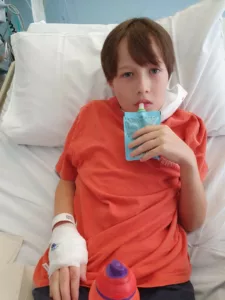 “I called up my GP and said ‘I’m not a mum who constantly has my kid at the doctor but I would like your help with this’. It was true – if you looked at our records we’d hardly ever been in and neither of my children had ever had antibiotics. I told her all the symptoms. The GP I now believe had her suspicions something was badly wrong but she was really cool and said she would make an appointment for us at the children’s assessment unit at Norwich Hospital. Once it was confirmed she rang me back and said I should pack an overnight bag but I probably wouldn’t need it. Again I think she didn’t want to upset me but she knew Henry was ill.”
“I called up my GP and said ‘I’m not a mum who constantly has my kid at the doctor but I would like your help with this’. It was true – if you looked at our records we’d hardly ever been in and neither of my children had ever had antibiotics. I told her all the symptoms. The GP I now believe had her suspicions something was badly wrong but she was really cool and said she would make an appointment for us at the children’s assessment unit at Norwich Hospital. Once it was confirmed she rang me back and said I should pack an overnight bag but I probably wouldn’t need it. Again I think she didn’t want to upset me but she knew Henry was ill.”
It was July 13th 2020 and only Tajana and Henry were allowed inside at the hospital due to lockdown restrictions. Henry was given blood tests and an x-ray. Less than an hour later Tajana was called into a room with six doctors and nurses, and told she could bring in her husband who’d been waiting outside in the carpark.
“They said do you know what wrong? I said I think he’s anaemic. They said no he’s got leukaemia. I started to cry. They said we don’t do treatment here, you have to go to hospital in Cambridge, we’re calling an ambulance.
“I will never forget that as we were getting into the ambulance I noticed one of the nurses giving me a sad look. Like she was feeling sorry for me. It really struck me. I wondered why she was looking at me like that. I now know why she did that – she knew what we’d have to go through and how hard it was going to be.”
On arrival at Addenbrooke’s Hospital in Cambridge, Henry was immediately admitted to Intensive Care and put on a drip.
“For the whole of that first night they were constantly testing his blood – it felt like they were draining him. I spent that night constantly feeling sick. It was so awful, I cannot explain the feeling. In the morning the doctor came to talk to us and everything happened so fast, it was out of our hands. She said Henry had acute lymphoblastic leukaemia (ALL) and needed to go on treatment straight away. His white blood cells were 421 – they should have been up to 20. Henry had a Hickman line put in and we had to sign lots of paperwork and just go along with whatever you were being told. You don’t want to sign it but you have to.”
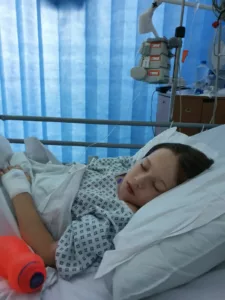 Henry stayed three nights in Intensive Care to start and was then transferred to the hospital’s cancer unit where chemotherapy was started immediately.
Henry stayed three nights in Intensive Care to start and was then transferred to the hospital’s cancer unit where chemotherapy was started immediately.
“I had to teach him how to swallow pills and deal with all the medication. He struggled to get used to his Hickman line – he’s a child who doesn’t like tags or wristbands even. It was hard work. He was on a drip for eight days. But slowly his white blood cells went down and everything was going the way it should go.
“I did it all alone as my husband couldn’t come in because of Covid. And Henry didn’t like being left alone so I didn’t shower for days. My bed was next to his but we were in a ward with three other children and machines constantly going off and nurses and doctors coming in all day and through the night. Sleep isn’t the thing that you think of. You don’t get a break at all.”
Henry was discharged from hospital after ten days for his chemotherapy to continue at home. Tajana continued to care for him and drove him back and forth to Cambridge and then Norwich several times a week for tests and medicines.
“He lost his hair twice, which was awful for him as Henry liked his hair longer. But it actually came at the stage where he was so sick he didn’t care anymore. He was slim and had to be kept a certain weight otherwise he would need to be tube fed, which would have been awful for him. So I had to find ways to fatten him up, which was so hard when he was on chemo and doesn’t want to eat. His legs were hurting at one point and he couldn’t walk so we had a wheelchair. Watching your child being that ill is really distressing. But fortunately they got rid of his cancer in five weeks, and we then moved on to the next stage of seven months of intensive treatment, followed by three years less-intensive maintenance.”
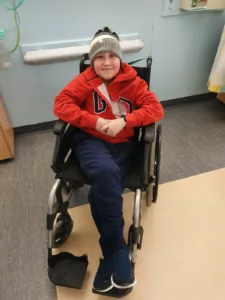 During Henry’s seven-month intensive treatment phase at home he was admitted to hospital multiple times when he caught a temperature. One time Henry developed a Hickman line infection and needed to go to hospital every day for two weeks for antibiotics, and on another occasion he caught chicken pox. He had an allergic reaction to medication, and once it was thought he was having a relapse and he was rushed back in to hospital. Fortunately, this was not the case, and Henry’s leukaemia hasn’t returned. But the whole experience turned his family’s life upside down.
During Henry’s seven-month intensive treatment phase at home he was admitted to hospital multiple times when he caught a temperature. One time Henry developed a Hickman line infection and needed to go to hospital every day for two weeks for antibiotics, and on another occasion he caught chicken pox. He had an allergic reaction to medication, and once it was thought he was having a relapse and he was rushed back in to hospital. Fortunately, this was not the case, and Henry’s leukaemia hasn’t returned. But the whole experience turned his family’s life upside down.
“I stopped working – I worked at a pre-school and had given up my job just before he was diagnosed. But I didn’t look for another job, it was impossible to work. For the first seven months he didn’t go to school and missed the whole of year 6. He only went back right at the end of a little bit. He did like school and missed it but also didn’t want people seeing him as he was with no hair and very weak. He went back last year but got so tired that he only did about 30 per cent of it. I never pushed him to go to school because of catching coughs and things. Also Henry is the sort of person who wouldn’t say he was tired. He would burn himself out and end up in hospital again and of course we didn’t want that.
“His little brother George was also affected and became really naughty. Henry was his best friend and George has dyslexia and a processing disorder and has trouble expressing himself. Even now he struggles to understand why Henry is back but hasn’t got so much energy, why he’s still sick even though he looks better. Now Henry has finished treatment we have a lot of rebuilding to do for George as well. My husband had to find a job working from home, which was less money, so he could be around with George.”
“Another thing that happened was just when Henry moved into the final maintenance stage of his chemotherapy George broke his femur and was bed-ridden for eight weeks. So I went from pushing Henry around in a wheelchair to having to use it for George.
“Of course the impact on Henry’s life has been huge. He had just started coming home on his own from school, just started being independent, and now all that’s gone. He’s not doing what 13 or 14-year-olds should be doing. All his friends have little jobs and Henry hasn’t even gone to the park on his own. It’s almost like we left him at ten years old. He has also become too addicted to his games because that’s the way he blocked it all out and communicated with friends. We now have difficulties getting him off gaming. It’s over but it’s not over and we have a lot of work to do.”
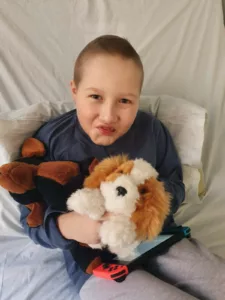 “But the oncology team were amazing, taking time to explain everything, staying on the phone longer to reassure me, and always being very organised. Henry actually now likes seeing them all when he goes for his appointment. I think you only realise how hard this is if you’ve been through it. No one else really understands. I cried a lot. I would drive and cry and put my music on and really loud like a crazy person to clear my head.”
“But the oncology team were amazing, taking time to explain everything, staying on the phone longer to reassure me, and always being very organised. Henry actually now likes seeing them all when he goes for his appointment. I think you only realise how hard this is if you’ve been through it. No one else really understands. I cried a lot. I would drive and cry and put my music on and really loud like a crazy person to clear my head.”
On October 18th 2023 Henry went to the hospital in Norwich to ‘ring the bell’ for the end of his treatment. His chemo is over but he remains on antibiotics for the next three months.
“If he gets a temperature for that period he will have to go into hospital. You have to be careful of germs everywhere. We worry about crowds, going to the cinema, being with friends – even picking up a piece of cake at the school fete.”
Looking back over the past three years, Tajana remembers two things that helped her. The first was setting up a Facebook page – ‘Henry’s journey through leukaemia’. Initially created to update friends on how Henry’s treatment was going, Tajana found people’s encouragement and ‘stay strong’ comments a big support during her most difficult times.
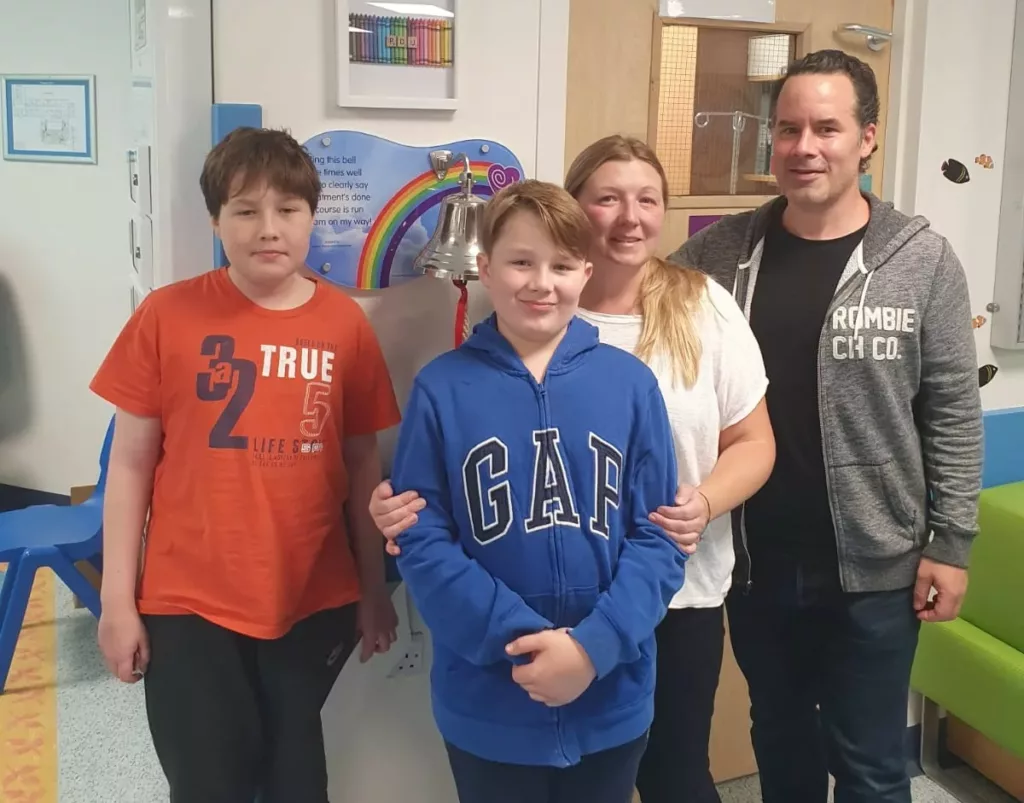
The second thing came with four paws, and helped not just her and Henry but the whole family – a miniature dachshund called Roco!
“Henry had wanted a dog for so long and I’d always said no. As soon as he got diagnosed he said can I have the dog now?! He was so sick I just said yes of course – and I am someone who keeps their word so in the end we got him. In fact before we got the real Roco we got Henry a soft toy dachshund which he would take with him to every appointment.
“Knowing he was getting his dog really helped keep Henry going. I would buy dog equipment and toys in preparation and show them to Henry. It kept our minds off everything. I had to speak to the doctor before we got Roco as they don’t advise getting new pets, but he said it would be fine. Now Roco is with us he’s helped us all. He’s a focus for us, and he’s such a happy little dog. Henry’s favourite place now is being on the sofa at home with Roco.”
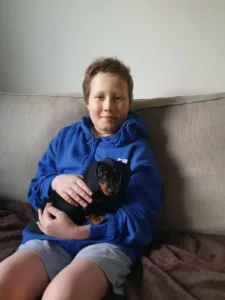
Read more stories from people affected by leukaemia.
Related posts
1 August 2022
Pedalling pair’s crazy peaks challenge to stop leukaemia cutting short the lives of beloved mums
Leukaemia UK supporter, Alistair, who lost is mum to leukaemia less than a year ago, is setting out on an extreme fundraising challenge. Alistair, who is from Lincoln, and his…
4 July 2022
Cancer charities unite in encouraging the Government to address crucial issues as part of their “War on Cancer”
In collaboration with our partners and as part of the One Cancer Voice group, Cancer 52 and Blood Cancer Alliance, we have called on the Government to take account of a wide range of recommendations as they finalise the 10-Year Cancer Plan to be announced later this year.
16 November 2023
Leukaemia UK appoints Hannah Peckham as newest Ambassador
Leukaemia UK has today announced its appointment of award-winning children’s book author, Hannah Peckham, as its newest celebrity Ambassador. Hannah joins the likes of actor Dougray Scott, celebrity chef Francesco…
7 November 2024
University of Southampton’s Dr Giorgia Chiodin Wins Olive Boles Innovation Award
Dr Giorgia Chiodin from the University of Southampton has been awarded the prestigious Olive Boles Innovation Award for 2024. Awarded annually to a Leukaemia UK John Goldman Fellow, this award…